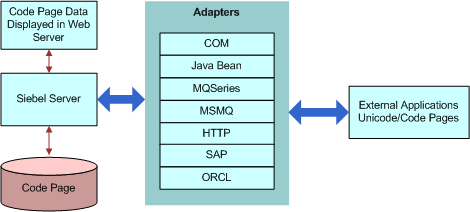Exchanging Data Between Applications that use Different Code Pages
If data is exchanged between applications that use different code pages, then the numeric representation of the code point for each character must be converted from the standard that is used by the source code page, into the equivalent character that is used by the destination code page. This conversion requirement is true when a character is converted from:
Unicode to a traditional code page. For example, UTF-16 to Shift-JS.
A traditional code page to Unicode. For example, Shift-JS to UTF-8.
One type of Unicode to another type of Unicode. For example, UTF-8 to UCS-2.
If there is no equivalent character in the destination code page, and if the conversion cannot be performed, then a conversion error is generated. Depending on the configuration, the conversion error might either terminate the current transaction, or the transaction might proceed by substituting replacement characters, as necessary, and ignoring the conversion error. For more information, see Transports and Interfaces: Siebel Enterprise Application Integration.
The following image illustrates how Siebel EAI supports the following adapters to integrate with an external application:
COM
Java Bean
MQSeries
MSMQ
HTTP
SAP
ORCL
Abilities inherent with each of these adapters include:
Work with the character encoding, as specified in the picklist
Perform conversion to or from the external encoding
Handle conversion errors

COM and Java Bean Unicode Protocols
COM and Java Bean are Unicode protocols. The sender and the recipient are responsible for converting the character sets. For example, because interfaces for a Siebel application automatically handle the conversion, these protocols are not required to perform a conversion. Error handling is handled differently by these protocols when compared to the other adapters.